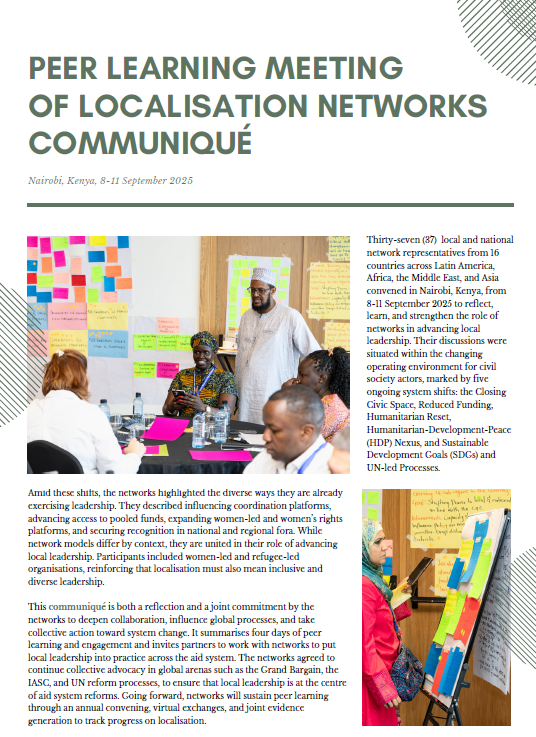ASAL Humanitarian Network (AHN)
Localisation and Network Leadership
Peer Learning Meeting in Nairobi Reinforces Local Leadership Across Regions
AHN Co-Convenes Global Localisation Networks to Advance System Change
Thirty-seven representatives of national and local networks from sixteen countries across Latin America, Africa, the Middle East, and Asia convened in Nairobi from 8–11 September 2025 for a four-day Peer Learning Meeting of Localisation Networks. Co-convened by the ASAL Humanitarian Network (AHN), Trócaire, Oxfam, and the Charter for Change Secretariat, the meeting provided a platform for networks to reflect on their leadership role in an evolving aid environment marked by five major system shifts: Closing Civic Space, Reduced Funding, the Humanitarian Reset, the Humanitarian-Development-Peace Nexus, and SDGs and UN-led Processes.
Participants highlighted the growing recognition of local and women-led leadership, the importance of equitable partnerships, and the need for shared accountability across the humanitarian system. The communiqué issued at the close of the meeting captures collective commitments to deepen collaboration, strengthen accountability mechanisms, and influence global processes such as the Grand Bargain and UN reform agendas.
AHN, representing Kenya’s arid and semi-arid lands, reaffirmed its commitment to champion locally led coordination, inclusive participation, and evidence-based advocacy. The network emphasized its continued role in bridging community-rooted action with national and global policy dialogue, and in supporting peer networks to operationalise localisation through practical tools, capacity-sharing models, and accountability frameworks.
The communiqué calls upon governments, donors, and international organisations to embed localisation within national development and disaster-risk frameworks, provide direct multi-year funding, and transfer leadership in coordination and pooled-fund mechanisms to local actors. Networks agreed to sustain this collaboration through annual convenings, virtual exchanges, and joint evidence generation to track progress on localisation.

